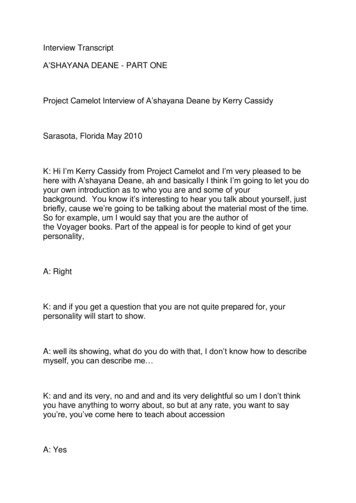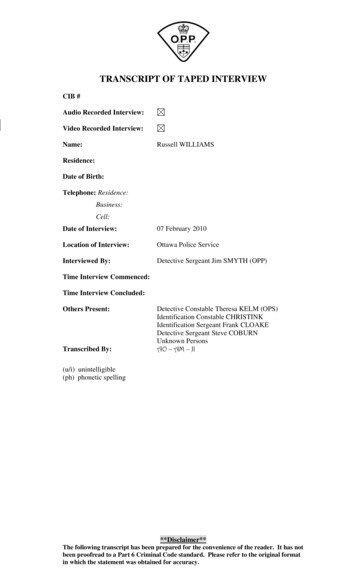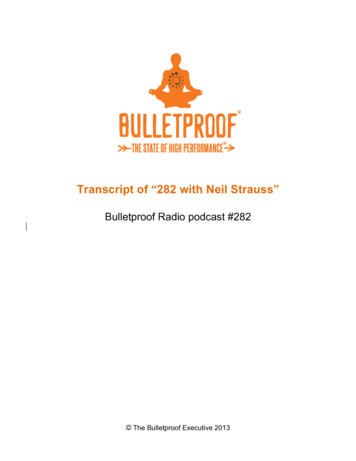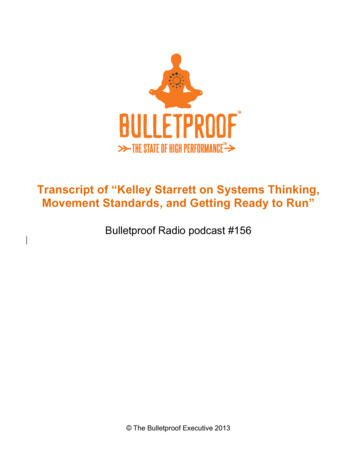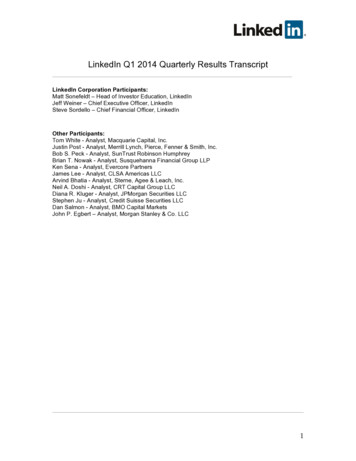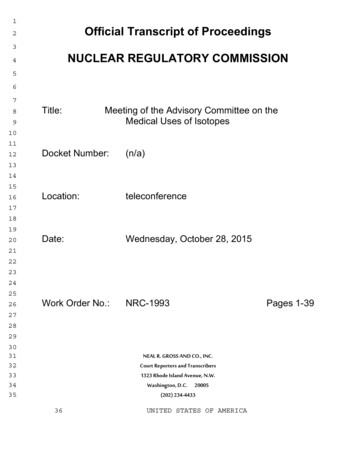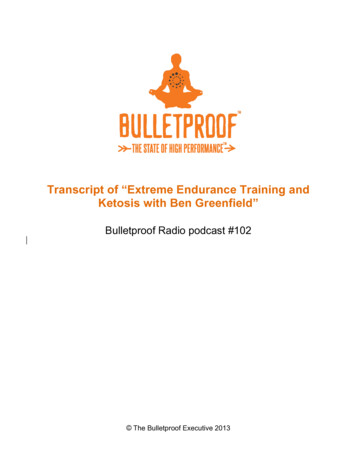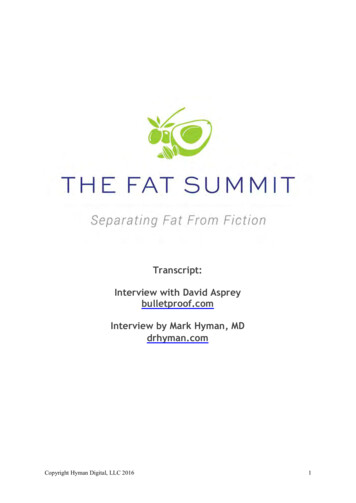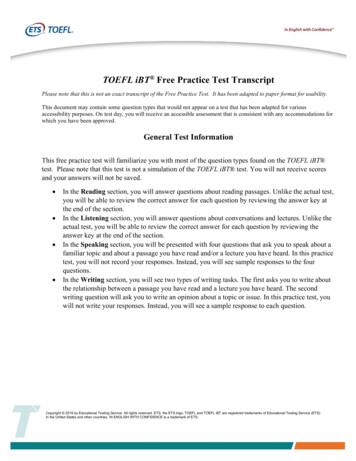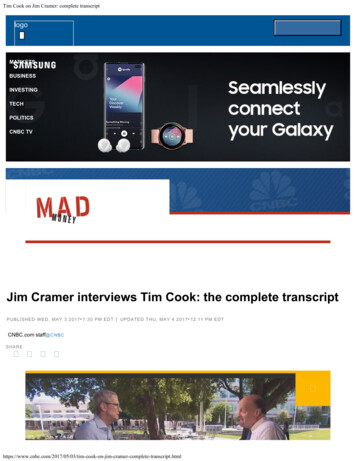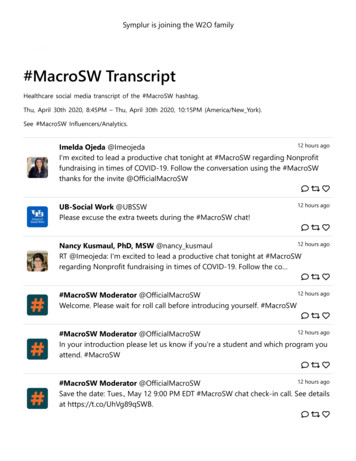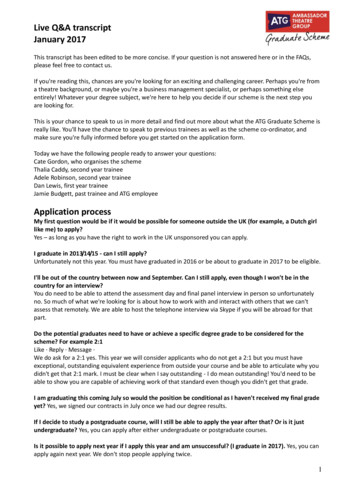
Transcription
Live Q&A transcriptJanuary 2017This transcript has been edited to be more concise. If your question is not answered here or in the FAQs,please feel free to contact us.If you're reading this, chances are you're looking for an exciting and challenging career. Perhaps you're froma theatre background, or maybe you're a business management specialist, or perhaps something elseentirely! Whatever your degree subject, we're here to help you decide if our scheme is the next step youare looking for.This is your chance to speak to us in more detail and find out more about what the ATG Graduate Scheme isreally like. You'll have the chance to speak to previous trainees as well as the scheme co-ordinator, andmake sure you're fully informed before you get started on the application form.Today we have the following people ready to answer your questions:Cate Gordon, who organises the schemeThalia Caddy, second year traineeAdele Robinson, second year traineeDan Lewis, first year traineeJamie Budgett, past trainee and ATG employeeApplication processMy first question would be if it would be possible for someone outside the UK (for example, a Dutch girllike me) to apply?Yes – as long as you have the right to work in the UK unsponsored you can apply.I graduate in 2013/14/15 - can I still apply?Unfortunately not this year. You must have graduated in 2016 or be about to graduate in 2017 to be eligible.I'll be out of the country between now and September. Can I still apply, even though I won't be in thecountry for an interview?You do need to be able to attend the assessment day and final panel interview in person so unfortunatelyno. So much of what we're looking for is about how to work with and interact with others that we can'tassess that remotely. We are able to host the telephone interview via Skype if you will be abroad for thatpart.Do the potential graduates need to have or achieve a specific degree grade to be considered for thescheme? For example 2:1Like · Reply · Message ·We do ask for a 2:1 yes. This year we will consider applicants who do not get a 2:1 but you must haveexceptional, outstanding equivalent experience from outside your course and be able to articulate why youdidn't get that 2:1 mark. I must be clear when I say outstanding - I do mean outstanding! You'd need to beable to show you are capable of achieving work of that standard even though you didn't get that grade.I am graduating this coming July so would the position be conditional as I haven't received my final gradeyet? Yes, we signed our contracts in July once we had our degree results.If I decide to study a postgraduate course, will I still be able to apply the year after that? Or is it justundergraduate? Yes, you can apply after either undergraduate or postgraduate courses.Is it possible to apply next year if I apply this year and am unsuccessful? (I graduate in 2017). Yes, you canapply again next year. We don't stop people applying twice.1
Live Q&A transcriptJanuary 2017If I am successful with the graduate scheme - and the time comes and I am unsure, could I transfer myplace till next year or re-apply? No, you cannot defer. There are only two places and we’re looking forsomeone able to start this September. You are able to reapply if you don’t get offered a place, as long as youwill still be within a year of graduating.What is the interview process like?The Interview process consists of a written application form, telephone interview, assessment centre, and apanel interview. The phone interview is up to 30 minutes with me and one other member of ourrecruitment team. The team is made up of managers from across the business - some general managerswho run our theatres, some department managers from our 'shared services' departments like customerexperience, programming or accounts. The panel interview is with our HR Director and another senior exec,and myself and we ask you to make a presentation as well as answer some questions and have aconversation with us. We're very friendly!It is hard work but so rewarding. I've kept in touch with a few people from the recruitment day, and theyreally feel like they gained a lot from the whole experience.Is there anything you can recommend really getting to grips with? Like focusing on audienceinteraction/ATG's marketing strategies etc?We don't test you on your knowledge of the company before you start working here, particularly. We'dexpect you to have done your research - so anything that is publicly available we'd expect you to have read,and of course bring your ideas! If you have an idea about our marketing strategies and you want to bringthose to your interview, please do, but we won't be testing you on something you couldn't have learntbefore working here, that would be mean! We're looking for potential.What does the assessment centre entail? And are you expected to bring a portfolio of work?The assessment centre is fun actually! I learn a lot from doing these days. It will involve some activitiesyou'll undertake in small groups that relate to the kind of work you'd be doing as a trainee. It's not so muchabout testing your knowledge as giving us a chance to see how you work with other people. So no, youdon't need to bring a portfolio although after the assessment day, a small group will go on to a panelinterview with our HR Director Susan and other senior staff, and you could bring it then if you wanted to.Given the nature of the scheme I'm sure many applicants (including myself!) will be applying from atheatre degree background, what helps you to narrow these applications down?We use the person specification, which is essentially an agreed list of what we are looking for. In the firstinstance, we will read everyone's application forms carefully - each form will have been read by at least twodifferent people at some stage in the process. We look carefully for examples of each of those things in theperson spec, and score them (for example, a form that doesn't mention something might get 0 points,whereas a form that mentions it and gives an excellent example that demonstrates how your skills andqualities match the job might get 10 points).The degree subject you have done doesn't matter though. It is about making sure you read that personspecification carefully and give us examples that demonstrate that is the kind of person you are. The personspec is a good guide for you too as it tells you something about us as a company and what we think isimportant.Hi Thalia, Dan, Adele and Jamie, you have all been through the process and were successful in beingplaced on the graduate scheme, are there any tops tips of how to succeed? Or is there anything inparticular Cate that ATG are looking for in a potential graduates?I would say the most important thing is to come across passionate about wanting to work in this company2
Live Q&A transcriptJanuary 2017and to be open minded and interested in every aspect of ATG as a company and the industry as a whole. Aswell as that, for this scheme you definitely need to be proactive about developing yourself! I believe there isalso a person spec on the Grad Scheme webpage that tells you a bit more about what type of person thecompany are looking for.We're looking for people who could one day lead our theatres, departments, maybe the company or evenbe the next influencers of the theatre industry. You don't have to be that right now - we're looking forpotential. If you have a look at the person spec, we've distilled there what we think that person needs to belike. This spec does change as the needs of the business change.When we interview for this and other trainee roles in the company though, what makes people stand outfor me is the real insight they have into themselves - what makes them tick, and why they are applying. Thestrongest applicants are always the ones who can tell us who they are and why they are applying - whichmust sound really silly but perhaps you'd be surprised how many people don't do that.We sent this response to a question emailed in:I think the applications that really stand out are the ones that demonstrate some real insight into bothyourself, and the company. I don’t mean you need to have special inside knowledge of ATG, but outstandingapplications often show through the examples they have chosen or answers given that they recognise whatthe company values and aims to achieve, and perhaps areas where the company could develop or grow. Youmight do this consciously – generally good applications from people that have read up on the companyusing what is publicly available – or unconsciously, by which I mean you might use an example in one ofyour answers where you don’t know it, but we can see you have a real ability in a skill the company needs,for example. On a really basic level, the best applications are the ones where people have read the personspecification and clearly told us why they think they are the right person for the job and for ATG as acompany.There’s not another graduate scheme in theatre like this, and so we know the scheme gets a lot of attentionsimply because it is a salaried graduate role in theatre which I appreciate might feel like gold dust! Thescheme is genuinely a fantastic opportunity, but the other piece of the puzzle is whether or not ATG is theright company for you too. Find out about the company online and see what you think of what we do, asnot all companies are the same of course. When applying for jobs particularly early in your working life it iseasy to spend all your time focussing on selling yourself to the recruiter and not think about whether itactually sounds like somewhere you would like to work so I’d encourage you to do your research.Do you have had to have a large amount of previous management experience/experience in a variety ofroles prior to the scheme to be successful?I had absolutely no management experience whatsoever! The company are looking for potential rather thanthe finished article so that is all you will need to demonstrate.It's worth having a think about how you work with others - if you read the person spec, you can see a lot ofwhat we are looking for is someone that is good with people. That doesn't mean you have to have beentheir formal line manager before though. Think 'transferable skills'Location & logisticsWill the scheme be based in London?Good question - partly yes, partly no! ATG has 38 theatres/venues in the UK and three office bases ('sharedservices' and IT offices in London and head office, accounts and HR in Woking). For the first 6 monthstrainees will be working full time in one of our regional venues (everything outside London plus Richmondand Wimbledon) so it's safe to say that first 6 months will probably not be in London. You'll then do 63
Live Q&A transcriptJanuary 2017months in London in our offices and a West End Theatre. The second year we don't know as we create theplacements depending on what is happening in the business at the time, but we can't guarantee that wouldbe in London. It's important to note we can't guarantee you'd be working in any particular theatre or area ofthe country. If you're thinking 'I want to work in my local ATG theatre, and only that theatre' then thisscheme isn't what you're looking for. You can see the jobs that might be coming up in your local theatre onour ATGTickets.com jobs page.With the different placements taking place across the country, do ATG help with finding accommodationas it is not for a long period of time, or do the graduates find their own accommodation? Are you able toprovide support regarding living arrangements and moving from place to place?Sometimes if we are asking you to go somewhere for just a short time we'll book somewhere for you. forinstance, we sent Rosie and Dan to work at the Edinburgh Playhouse for just a week top help open MammaMia, so we booked somewhere for them to stay. Whereas if it is somewhere you're moving for 6 months,then it is up to you to find accommodation although we do contribute to rent/moving costs.There is some assistance with finding accommodation - all of our venues have what's called a "digs list"which we have access to - this is basically a list of local accommodation providers approved by the venue,which generally host touring actors during their stay. This is a really useful tool for finding what's out there,there are also various theatre digs websites which are great too. Equally useful are the sites like SpareRoom, AirBnB etc which have plenty of options on them.ATG also offers a relocation package which we'd discuss at the telephone interview stage. When we ask youto move as part of your job, ATG will contribute towards rent and moving costs as we ask trainees to moveso often!Hi Thalia, Dan, Adele and Jamie, I know you haven't all completed the scheme yet but I was justinterested to know how you personally found moving to and from the different placements and living inparts of the country you are or were possibly unfamiliar with?I've moved three times, and am about to move again. Firstly I moved to Liverpool, which is a fantastic city! Ilived on my own in a studio flat, which was actually quite easy to find. I didn't know anyone at all in the city,so I think in retrospect I should how found somewhere to live with other people, but it depends what yourpreferences are. Since then I've lived in two places in London and I know lots of people here, and there isalways so much to do, so that has been easier, but moving around can be pretty hard work. I'm going to bemoving for my final project again, which I'm really excited about. I think I've learnt so much about myselfbecause of all of this moving. There have been hard times, it is pretty taxing, but ATG are really good atsupporting you through those. I'd recommend it though - the experiences you get from living and workingin different parts of the country is incredible, and you'll become connected to ATG and its employees thatlots of other people in the company are jealo
This is your chance to speak to us in more detail and find out more about what the ATG Graduate Scheme is really like. You'll have the chance to speak to previous trainees as well as the scheme co-ordinator, and make sure you're fully informed before you get started on the application form. Today we have the following people ready to answer your questions: Cate Gordon, who organises the scheme .
